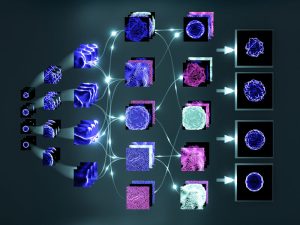Introduction
Cancer is one of the leading causes of death globally, with millions of people diagnosed each year. Despite significant progress in cancer research, there is still a long way to go in terms of improving diagnosis, treatment, and outcomes. However, with the emergence of artificial intelligence (AI), the future of oncology looks promising, with the potential to transform the way cancer research is conducted.
The impact of AI on cancer research is becoming increasingly significant as AI-based systems and algorithms are being developed and utilized in various aspects of cancer care. AI has the potential to revolutionize the field of oncology by improving screening methods, enhancing image analysis, and enabling earlier detection of cancer. Moreover, it can help optimize treatment plans, minimize side effects, and lead to more effective drug discovery.
In recent years, there have been significant advances in AI, particularly in the areas of deep learning, machine learning, and natural language processing. These technologies are being harnessed to analyze large amounts of data and identify patterns and anomalies that might not be visible to the human eye. AI algorithms are also capable of learning and improving with each iteration, enabling them to make more informed decisions as they are exposed to more data.
The potential applications of AI in cancer research are vast, including precision medicine, clinical trials, and predicting cancer outcomes. With precision medicine, AI-based systems can analyze patient data, including genetic information, to identify the best treatment options for a particular patient. In clinical trials, AI can help identify suitable participants, monitor patient outcomes, and reduce the time and cost involved in drug development. In predicting cancer outcomes, AI can analyze patient data to provide personalized prognostic information that can guide treatment decisions.

The Role of AI in Cancer Diagnosis
Cancer diagnosis is one of the most complex and challenging areas in medicine, and it has become even more so in recent years as we seek to better understand the complex mechanisms of cancer development and progression. However, artificial intelligence (AI) is poised to revolutionize the field of oncology, and in particular, the diagnosis of cancer. In this section, we will explore the role of AI in cancer diagnosis, focusing on how it can improve cancer screening, the use of AI in image analysis for cancer diagnosis, and the potential of AI for early detection of cancer.
1. How AI Can Improve Cancer Screening
Cancer screening is essential in identifying cancer at an early stage and providing the best treatment options for patients. However, traditional screening methods are often time-consuming and prone to error. AI-based systems can help to improve cancer screening by analyzing vast amounts of data and identifying patterns that may not be visible to the human eye. This can lead to more accurate and personalized screening options. Some of the ways that AI can improve cancer screening include:
- Identifying patterns: AI algorithms can be trained to identify patterns that are indicative of cancer, such as abnormal cell growth or the presence of tumors. This can help to identify potential cancer cases at an early stage.
- Improving accuracy: By analyzing patient data, including genetic information, AI can provide more accurate screening options. This can help to reduce false positives and false negatives, which can be costly both in terms of patient outcomes and healthcare costs.
- Personalizing screening options: AI can analyze patient data and provide personalized screening options based on the patient’s risk factors and medical history. This can lead to more targeted and effective screening programs.
2. The Use of AI in Image Analysis for Cancer Diagnosis
Medical imaging plays a vital role in cancer diagnosis, and AI-based systems can enhance image analysis to provide more accurate results. AI algorithms can identify subtle changes in medical images that may be indicative of cancer, such as the presence of tumors or the growth of abnormal cells. AI-based systems can also help medical professionals to interpret complex images and provide more accurate and detailed diagnoses. Some of the ways that AI can improve image analysis for cancer diagnosis include:
- Identifying early warning signs: AI algorithms can analyze medical images to identify early warning signs of cancer. This can help medical professionals to detect cancer at an early stage and provide the best treatment options for patients.
- Improving accuracy: By analyzing medical images, AI can provide more accurate diagnoses, reducing the risk of misdiagnosis and improving patient outcomes.
- Enhancing image interpretation: Medical images can be complex and difficult to interpret, particularly for medical professionals who are not specialists in radiology. AI-based systems can help to enhance image interpretation, providing more accurate and detailed diagnoses.
3. The Potential of AI for Early Detection of Cancer
Early detection of cancer is crucial for successful treatment outcomes. AI-based systems can help to identify early warning signs of cancer by analyzing patient data and identifying patterns that may be indicative of cancer. AI algorithms can also learn from patient data to provide more accurate and personalized diagnoses over time. Some of the ways that AI can enable early detection of cancer include:
- Personalizing risk assessments: AI can analyze patient data and provide personalized risk assessments, enabling medical professionals to identify patients who are at a higher risk of developing cancer.
- Identifying early warning signs: AI can analyze patient data to identify early warning signs of cancer, such as changes in biomarkers or the presence of specific genetic mutations.
- Improving treatment outcomes: By enabling early detection, AI can help medical professionals to provide the best treatment options for patients, improving treatment outcomes and reducing healthcare costs.
AI and Cancer Treatment
Artificial intelligence (AI) is transforming the landscape of cancer treatment by improving patient outcomes and increasing the speed and efficiency of drug development. This technology is proving to be a powerful tool in the fight against cancer, from diagnosis to treatment.
1. How AI Can Improve Cancer Treatment
Cancer treatment has traditionally been a “one-size-fits-all” approach, but this is changing with the use of AI. By analyzing large amounts of data from various sources, AI can help doctors make more informed decisions about the best treatment options for individual patients. Here are some ways AI can improve cancer treatment:
- Personalized treatment plans: AI algorithms can analyze data from a patient’s medical history, genetic makeup, and imaging results to create personalized treatment plans. This approach helps doctors select the most effective treatment with the least amount of side effects.
- Real-time monitoring: AI-powered monitoring systems can track a patient’s vital signs and treatment responses in real-time. This approach enables doctors to adjust treatment plans in real-time to optimize outcomes.
- Predictive analytics: AI can predict how a patient’s cancer will respond to specific treatments, allowing doctors to adjust treatment plans accordingly. This approach helps doctors choose the best course of action for each patient, leading to better outcomes.
2. The Role of AI in Drug Discovery
Drug discovery is a time-consuming and expensive process, but AI is making it faster and more efficient. By analyzing large amounts of data from clinical trials and scientific research, AI can identify promising drug candidates in a fraction of the time it would take humans to do so. Here are some ways AI is changing the drug discovery process:
- Predictive analytics: AI can predict which drug candidates are most likely to be successful in clinical trials, saving time and money.
- Precision medicine: AI can analyze patient data to identify subgroups of patients who are more likely to respond to specific treatments. This approach helps drug developers create more targeted and effective drugs.
- Automated screening: AI-powered screening systems can test thousands of compounds for potential therapeutic effects, reducing the time and resources required for drug discovery.
3. The Use of AI in Radiation Therapy
Radiation therapy is a common treatment for cancer, but it can have serious side effects if not delivered accurately. AI is helping to improve the accuracy and efficiency of radiation therapy. Here are some ways AI is changing radiation therapy:
- Treatment planning: AI algorithms can analyze imaging data to create personalized treatment plans for each patient. This approach ensures that the radiation is delivered precisely to the tumor, minimizing damage to surrounding healthy tissue.
- Real-time monitoring: AI-powered monitoring systems can track the movement of tumors during treatment, enabling doctors to adjust the radiation beam in real-time to ensure maximum effectiveness.
- Quality control: AI can analyze imaging data to ensure that the radiation is being delivered accurately and according to the treatment plan. This approach reduces the risk of errors and improves patient outcomes.
The Future of AI in Cancer Research
Artificial intelligence (AI) has made a significant impact on the field of oncology, revolutionizing cancer diagnosis, treatment, and research. AI-powered tools and algorithms have the potential to transform cancer care by enabling more precise, personalized, and effective treatments. In this section, we will explore the potential of AI in cancer research and how it can revolutionize the field.
1. The Potential of AI in Precision Medicine
Precision medicine aims to provide tailored treatments for individual patients based on their genetic, molecular, and clinical characteristics. AI has the potential to enhance precision medicine by enabling more accurate and comprehensive analysis of patient data. AI-powered tools can help identify the genetic and molecular changes that drive cancer, as well as the specific mutations that can make tumors resistant to treatment. This information can be used to develop personalized treatment plans that target the specific characteristics of an individual’s cancer.
2. AI and Clinical Trials
Clinical trials are a critical step in the development of new cancer treatments. However, traditional clinical trials can be time-consuming, expensive, and difficult to recruit patients. AI can help address these challenges by enabling more efficient and effective clinical trials. For example, AI-powered tools can help identify patients who are likely to respond to a specific treatment based on their genetic and molecular profiles. This can help streamline the recruitment process and improve the efficiency of clinical trials.
3. The Role of AI in Predicting Cancer Outcomes
Predicting cancer outcomes is a critical aspect of cancer care. AI has the potential to improve the accuracy and reliability of cancer prognosis by analyzing large amounts of patient data. For example, AI-powered tools can analyze imaging data to identify early signs of cancer recurrence, enabling clinicians to intervene before the cancer spreads. AI can also help identify patients who are at high risk of developing certain types of cancer, allowing for earlier detection and treatment.
Conclusion
The future of oncology looks promising with the integration of AI in cancer research. The use of AI can improve cancer diagnosis, treatment, and outcomes by enabling earlier detection, personalized treatment options, and more effective drug discovery. As the field of AI in oncology continues to evolve, we can expect to see even more significant improvements in cancer care.
